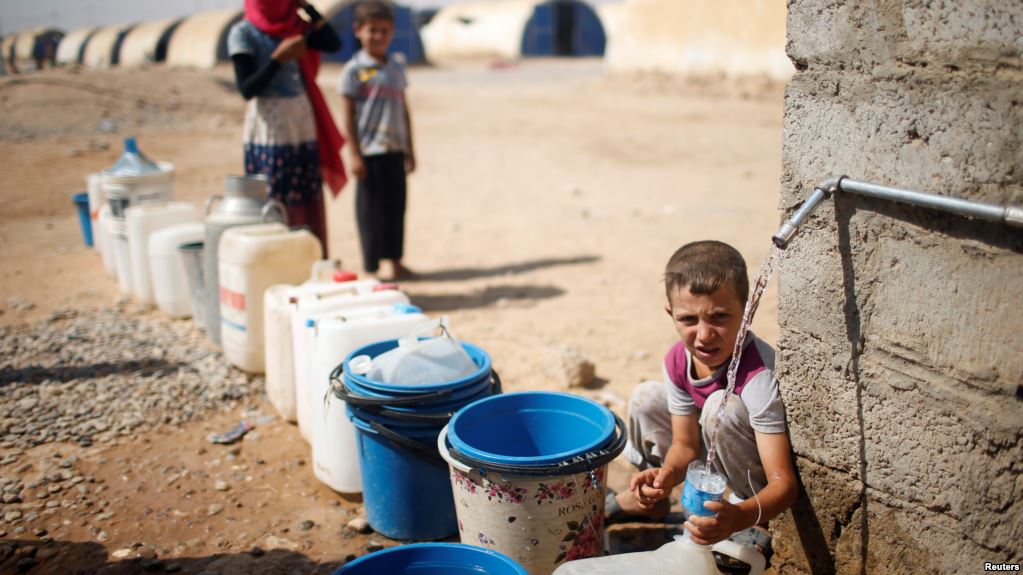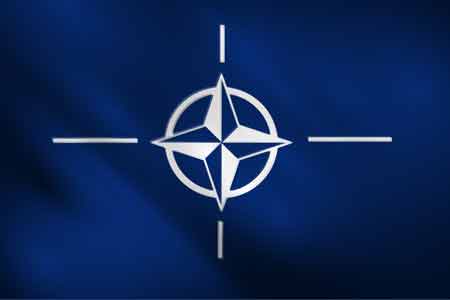
Reuters, 12 Dec 2017
After years battling Islamic State militants, Iraqi farmers - many of them military volunteers - are now returning to their homes and fields only to find a new threat: a shortage of water.
Construction of dams and other water-holding facilities in upstream Turkey and Iran, combined with increasingly erratic rainfall across the region, mean the amount of water flowing in key Iraqi rivers has fallen by at least 40 percent in recent decades, said Hassan Janabi, the country's water resources minister.
Damage to Iraq's own dams and other infrastructure from years of fighting - and from a recent earthquake - also is making water supplies more irregular, he said.
While war was raging, water was a secondary concern - but today it is fast becoming a new source of conflict, he said.
Farmers in swathes of southern Iraq have had too little water to plant this winter's wheat crop, leading to demonstrations and increasing anger, the minister said. By next summer, even drinking water may be in short supply in some areas, he warned.
"People are very, very upset," Janabi said at a conference on climate change and security issues at The Hague on Tuesday. "We somehow have a social conflict now."
Climate change is contributing to worsening security threats around the world, from growing migration to increased militancy, in hotspots from Africa´s Lake Chad basin and Mali to Iraq, government and military officials said at the conference in the Netherlands.
But acting effectively on those threats remains a challenge, in large part because doing so often requires bringing together not just different countries but leaders in wide-ranging fields - from peacekeeping to environmental action, food security and migration - who do not usually work together.
"There is a real need to bring together all the different pieces of this puzzle," said Janani Vivekananda, a senior advisor on climate change and peacebuilding at adelphi, a German thinktank focused on climate, environment and development issues.
In particular, "we need to bring in people who think, `Climate change? That´s not us´", she said.
U.S. MILITARY STEPS UP
In some cases, that is already beginning to happen. The U.S. military, for example, for years has been a leader in looking at security threats from climate change. It has also been altering its own operations - including by reducing its use of fossil fuels and adopting renewable energy - to try to reduce them, experts said.
"There´s a willingness now to understand how these trends - water scarcity, changing climate factors, energy resources - are affecting our broader national security and geopolitical situation," said Sherri Goodman, a senior adviser for international security at the U.S. Center for Climate and Security, a policy institute with top military experts on its advisory board.
Many Europeans, similarly, are increasingly aware that top priority problems at home - such as dealing with growing flows of migrants - are "intimately connected" to security and climate threats elsewhere, said Monika Sie Dhian Ho, the general director of the Clingendael Institute, a Dutch think tank on international relations.
"We see how urgent this thing is," she said. "We really need to invest in climate problems to deal with the migration and refugees and the security risks that develop as a consequence of that."
At the conference, the foreign ministers of the Netherlands, Sweden and Belgium and other participants signed a declaration pledging to work together on a range of security threats.
Those include better coordination of migration and climate change responses, promoting better urban resilience and strengthening climate-sensitive development in Mali, water security in Iraq and risk assessments in the Lake Chad region.
PARCHED IRAQ
Janabi, Iraq´s water resources minister, said his country and others have been slow to focus on climate change-related threats not only because of other pressing priorities - not least war with Islamic State militants - but because climate pressures often build slowly and are harder to see.
"When the threat is cumulative, people tend to overlook the challenge. But it is not less a threat to the nation and stability," he said.
Dealing with growing water security threats, however, has been difficult in a country financially devastated by years of war and by low oil prices, which have cut one of its main sources of income, said Janabi, who oversaw the restoration of Iraq´s parched southern marshlands, now a World Heritage listed site.
The minister said fighting in Iraq had damaged significant parts of the country's water infrastructure but his capital investment budget for water infrastructure improvements over the next two years is set at zero, even as demand to solve the country´s water shortages soars and the country imports 70 percent of its food.
Solving the problems ultimately may require not just repairs and better use of limited water but negotiating effective water sharing agreements with Turkey and Iran - something that will be a huge challenge in a region where "geopolitics is an issue", he said. (Reporting by Laurie Goering @lauriegoering; editing by Alex Whiting:; Please credit the Thomson Reuters Foundation, the charitable arm of Thomson Reuters, that covers humanitarian news, climate change, resilience, women's rights, trafficking and property rights.
No comments yet.
- ECHR: ARMENIA HAS TO PAY FOR DAMAGE TO AZERBAIJANI IDPS The Caucasus and Turkish-Armenian Relations 13.12.2017
-
 NATO EXPERTS: RUSSIA USES THE PRINCIPLE OF THREE "C" IN SOUTH CAUCASUS
The Caucasus and Turkish-Armenian Relations
13.12.2017
NATO EXPERTS: RUSSIA USES THE PRINCIPLE OF THREE "C" IN SOUTH CAUCASUS
The Caucasus and Turkish-Armenian Relations
13.12.2017
- CORPORATE GIANTS URGE EU TO BACK 35% RENEWABLES TARGET Europe - EU 13.12.2017
- AMNESTY INTERNATIONAL CLAIMS EU 'COMPLICIT' IN LIBYA MIGRANT ABUSES Europe - EU 13.12.2017
- THERESA MAY BACKS UNIFIED IRAQ IN CALL TO KURDISH PM Iraq 13.12.2017
-
25.01.2016
THE ARMENIAN QUESTION - BASIC KNOWLEDGE AND DOCUMENTATION -
12.06.2024
THE TRUTH WILL OUT -
27.03.2023
RADİKAL ERMENİ UNSURLARCA GERÇEKLEŞTİRİLEN MEZALİMLER VE VANDALİZM -
17.03.2023
PATRIOTISM PERVERTED -
23.02.2023
MEN ARE LIKE THAT -
03.02.2023
BAKÜ-TİFLİS-CEYHAN BORU HATTININ YAŞANAN TARİHİ -
16.12.2022
INTERNATIONAL SCHOLARS ON THE EVENTS OF 1915 -
07.12.2022
FAKE PHOTOS AND THE ARMENIAN PROPAGANDA -
07.12.2022
ERMENİ PROPAGANDASI VE SAHTE RESİMLER -
01.01.2022
A Letter From Japan - Strategically Mum: The Silence of the Armenians -
01.01.2022
Japonya'dan Bir Mektup - Stratejik Suskunluk: Ermenilerin Sessizliği -
03.06.2020
Anastas Mikoyan: Confessions of an Armenian Bolshevik -
08.04.2020
Sovyet Sonrası Ukrayna’da Devlet, Toplum ve Siyaset - Değişen Dinamikler, Dönüşen Kimlikler -
12.06.2018
Ermeni Sorunuyla İlgili İngiliz Belgeleri (1912-1923) - British Documents on Armenian Question (1912-1923) -
02.12.2016
Turkish-Russian Academics: A Historical Study on the Caucasus -
01.07.2016
Gürcistan'daki Müslüman Topluluklar: Azınlık Hakları, Kimlik, Siyaset -
10.03.2016
Armenian Diaspora: Diaspora, State and the Imagination of the Republic of Armenia -
24.01.2016
ERMENİ SORUNU - TEMEL BİLGİ VE BELGELER (2. BASKI)
-
AVİM Conference Hall 24.01.2023
CONFERENCE TITLED “HUNGARY’S PERSPECTIVES ON THE TURKIC WORLD"









